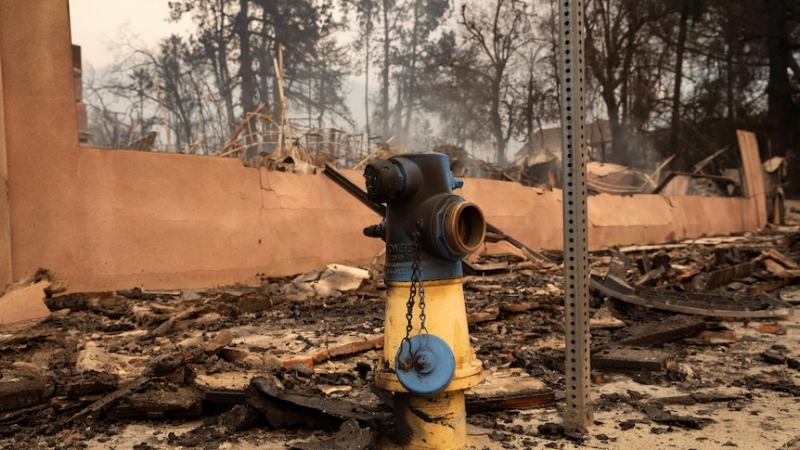With almost 180,000 people ordered to leave their homes as wildfires rage in Los Angeles — firefighters are beginning to run out of water supplies. (Reuters: Zaydee Sanchez)
As wildfires raged across Los Angeles, it took just days for another disaster to rear its head, the city was running out of water to fight them.
Now experts warn if the flames continue to spread, there will not be enough water available to keep them at bay and maintain LA's almost 4 million strong population.
The lack of available water supplies has led to a political back and forth between President-elect Donald Trump and California Governor Gavin Newsom.
So why does LA seem to be running out of water?
The most destructive natural disaster in LA history
So far, it is believed about 10 people have died since the wildfires started on Monday, while almost 180,000 residents have been asked to leave their homes.
LA Fire Department Chief Kristin Crowley described the wildfires as one of the most destructive natural disasters in Los Angeles history with the number of properties damaged or destroyed by the Palisades fire "in the thousands".
But as firefighters try to keep the wildfires at bay, the city's water supply has started to go empty.
About 40 per cent of Los Angeles city water comes from state-controlled projects connected to northern California and the state has limited the water it delivers this year.
But the southern California reservoirs these canals help feed are at above-average levels for this time of year.
Los Angeles Mayor Karen Bass said that roughly 20 per cent of hydrants across the city went dry as crews battled blazes.
Fires can hurt key infrastructure by causing power cuts and damaging water pipes.
Firefighters faced further difficulties with the Santa Ana winds, which occur each year in California usually in the cooler months between September and May.
Sometimes called the 'devil winds', the Santa Ana winds have fuelled some of California's worst fires.
Firefighters in southern California are use to dealing with strong Santa Ana winds, but the hurricane-force gusts earlier in the week took them by surprise.
Pictures show Los Angeles wildfire damage
Photo shows A firefighter battles a fire.
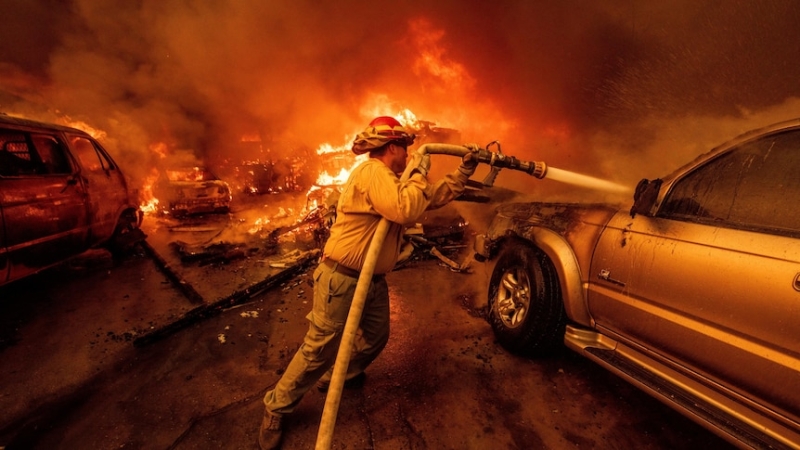
The winds grounded firefighting aircraft that should have been making critical water drops, straining the hydrant system.
"This is unlike anything I've seen in my 25 years on the fire department," Los Angeles Fire Captain Adam VanGerpen told CBS This Morning.
Janisse Quiñones, head of the Los Angeles Department of Water and Power, said the ferocity of the fire made the water demand four times greater than "we've ever seen in the system."
Ms Quiñones said hydrants are designed for fighting fires at one or two houses at a time, not hundreds, and refilling the tanks also requires asking fire departments to pause firefighting efforts.
Why is LA running out of water?
Jay Lund, a professor in civil and environmental engineering at the University of California Davis, said city water tanks are typically designed to be able to put out localised fires, not widespread fires like the ones blazing in Los Angeles.
"It's not a matter of there's not enough water in Southern California, it's a matter of there's not enough water in that particular area of Southern California just for those few hours that you need it to fight the fires," Mr Lund said.
The Los Angeles Department of Water and Power said that in advance of the windstorm, it had filled all available water tanks in the city, including three 1-million-gallon (3.8-million-litre) tanks in the Palisades area.
The area had exhausted the three water storage tanks by early Wednesday, Ms Quiñones said in a press briefing.
"We're fighting a wildfire with urban water systems, and that is really challenging," she added, noting that Pacific Palisades experienced four times the normal water demand for 15 hours as firefighters battled the blaze.
The department urged locals to conserve water, and said it had deployed 18 water trucks of 2,000 to 4,000 gallons since Tuesday to help firefighters.
Mr Lund said the nature of the fires was such that it was nearly impossible to arrange enough water in advance.
"If everything catches fire at once, there's not going to be enough water for everybody," he said.
"There's just no way that you could fit the pipes to work to move that much water across that area in a short period of time."
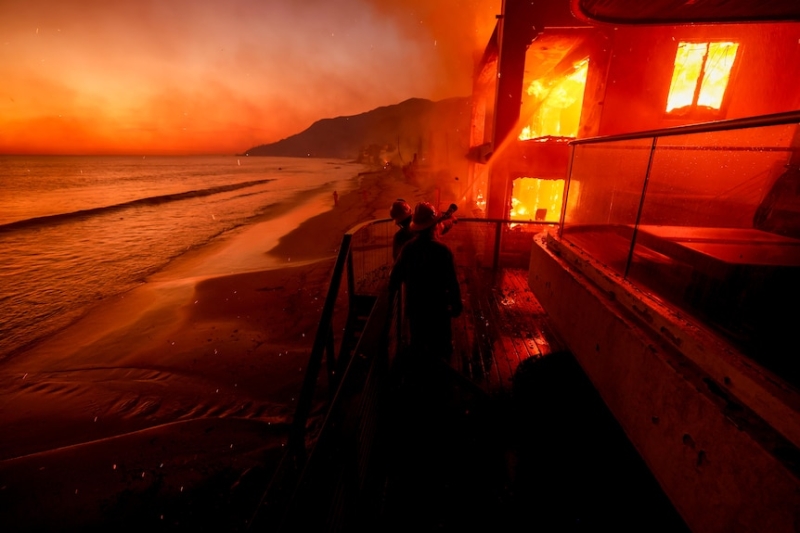
Some experts have described the issues surrounding water supply during the LA wildfires as an infrastructure issue. (AP: Etienne Laurent)
Gregory Pierce, director of the UCLA Water Resources Group and an adjunct professor at the Department of Urban Planning, said the fires were unusually intense even by Southern California standards.
He said the problem was not a lack of water so much as the difficulties in rapidly getting large amounts of water to a specific point where it was needed, which would entail major investments in power and infrastructure.
The LA wildfires turn political
The LA wildfires have intensified tensions between President-elect Donald Trump and California Governor Gavin Newsom.
On Thursday, Trump said on social media that Mr Newsom should "open up the water main".
"NO MORE EXCUSES FROM THIS INCOMPETENT GOVERNOR," Trump said, adding, "IT'S ALREADY FAR TOO LATE!"
Governor Newsom responded to the criticism from Mr Trump when asked about it by CNN.
"People are literally fleeing. People have lost their lives. Kids lost their schools. Families completely torn asunder. Churches burned down, and this guy wants to politicise it," Mr Newsom said.
"I have a lot of thoughts and I know what I want to say, but I won't."
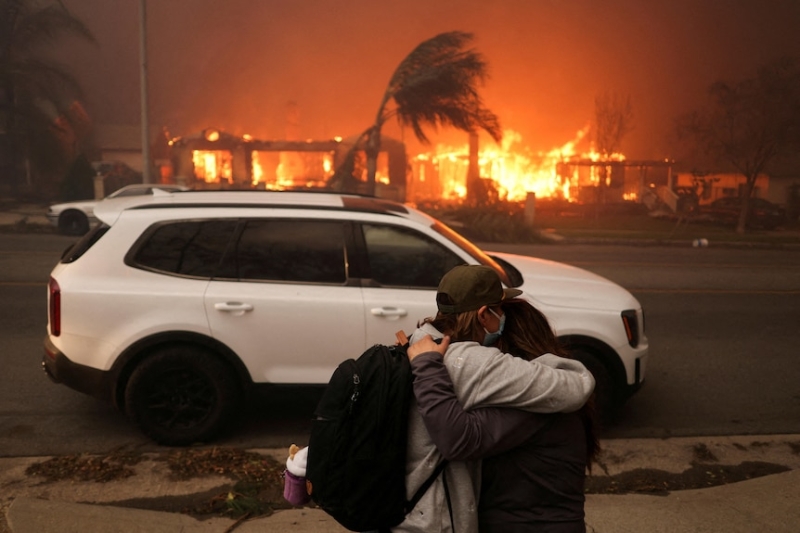
Some experts have been critical of President-elect Donald Trump over his comments surrounding the LA wildfires describing them as a misinformation. (Reuters: David Swanson)
In a post on his Truth Social media network, Trump tried to connect dry hydrants to criticism of the state's approach to balancing the distribution of water to farms and cities with the need to protect endangered species.
But as experts have highlighted the debate has nothing to do with the hydrant issue in Los Angeles, driven by an intense demand on a municipal system not designed to battle such blazes.
Before-and-after images of Los Angeles fires
Celebrities who have lost their multi-million-dollar homes
Maps reveal how quickly a ring of fire besieged LA
Why is Los Angeles running out of water?
Peter Gleick, a climate and water scientist, was critical of Mr Trump's claims about the LA wildfires describing them as misinformation.
He explained the issues facing Los Angeles' water supply were due to several factors.
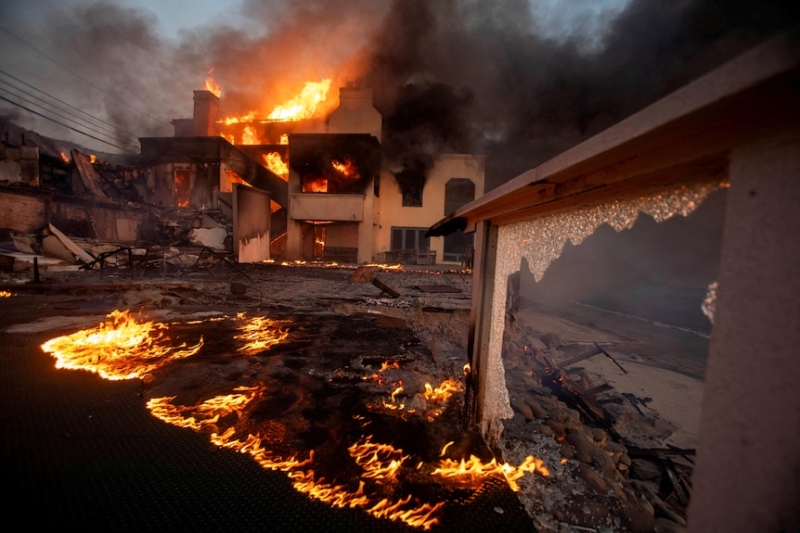
An expert said huge demands overwhelmed southern California's water infrastructure causing water supply issues. (Reuters: Ringo Chiu)
They included high demands for fire-fighting water, the damages to pipes and pumps by the fires, and people leaving hoses and sprinklers on to try to protect their homes.
"All of these demands overwhelmed the water-supply infrastructure, causing some water tanks and hydrants to lose pressure or dry up," he said.
"They have nothing to do with the overall availability of water to southern California and nothing to do with the state's efforts to protect endangered and threatened fish and ecosystems."
Could this happen in Australia?
Water preparation and storage varies by state.
Maps reveal how quickly a ring of fire besieged Los Angeles
Photo shows Population density map shows fires spreading across some of LA's most populous neighbourhoods
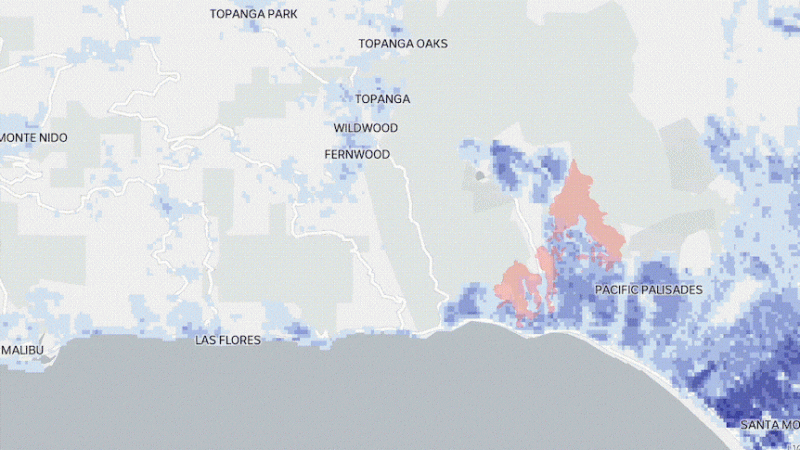
However, a study published in the Fire Safety Journal examining two communities impacted by bushfires in New South Wales in 2013 found households relied solely on secondary water supplies for both survival and firefighting.
The study also found that issues surrounding water shortages and equipment failure impacted survival-related decisions people made during bushfires.
"These concomitant yet competing conditions of water in a geographically vast and seasonally water-poor country like Australia point to the importance of considering the trade-offs people make between the risk, benefits and everyday demands of living in fire-prone landscapes," the report read.
ABC/Wires

